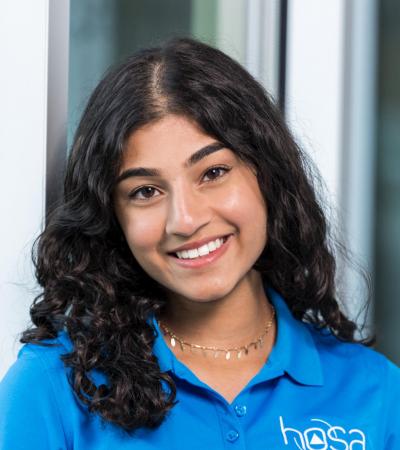Bijapur Emergency Medicine Education Project; India
Experiencing the World Fellowship
Adviser: Elizabeth Wood
Organization: St. Joseph Health and Community Center Bijapur, India
Final Project:
Over the past month, I’ve embarked on an immensely transformative journey in Bijapur, India. Initially, I anticipated a familiar experience in setting, drawing on my past visits to small villages in India. Yet, from my arrival, I quickly realized the vast differences. On the drive from the airport, I saw piles of trash bordering the road. The nearby landscape was filled with dust and even dung in many areas. I watched caravans of nomadic people with donkeys carrying their belongings trudge on the side of the road. Shacks used as houses and stores lined the roads. To say this area was impoverished certainly felt like an understatement.
Upon arrival at St. Joseph’s Community Health Center and Orphanage, I couldn’t help but feel some apprehension. However, my unease quickly dissolved as the loving nuns welcomed me into their home. After taking a couple of days to adjust to the new environment and go over the first-aid curriculum I developed with the medical team, I set out with them in their mobile clinic to the first of twelve villages.
At each village, I was incredibly inspired by the villagers' genuine eagerness to learn. Despite the hot weather and chores they had waiting for them at home, they intently listened, practiced, and asked questions. In total, I was able to teach about 1,000 individuals! After my sessions, many individuals even came up and thanked me, saying that no local health employees had ever come out to teach them any basic health care before.
These conversations also led to many revelations about the social struggles that afflicted them. The session attendees were predominantly female, so I quickly became well-versed with their specific struggles. Child marriage, for instance, is very common in this area. I met a young woman who was the same age as me (19) and she already had three children, the oldest being 6 years old! They revealed that the fathers of the family felt it their only responsibility for their daughters to get married so they typically proposed to another family in the village, as early as the daughter turning 2 years old, and send the daughter to her husband’s family house when the daughter matures. They also discussed the discrimination and physical abuse that many women have to bear due to a culture that turns a blind eye toward them.
I also learned of an even more heartbreaking discrimination—discrimination against HIV-afflicted orphans. While staying at St. Joseph’ Convent, I spent a lot of time with the children in the orphanage tutoring, mentoring, and even playing volleyball with them. I quickly noticed that they seemed far behind in their studies. Sr. Shanthi informed me that due to misinformation on the contagiousness of HIV, the orphans were not allowed at the local public schools. Worse, most doctors in the area also wouldn’t treat them, especially in emergency situations that involved blood. Deeply impacted by this injustice, I helped where I could—I fundraised and purchased them a computer and have continued to tutor them virtually.
This does little, however, to abate the discrimination they face from the medical system, a system that from my experience seems to face corruption throughout the area. Though the care is more affordable than the US system, there's a concerning prevalence of fraudulent prescriptions. For instance, to provide fast results that convince health-illiterate patients to become returning customers, doctors overprescribe steroidal medicine that is harming their health long-term. I also found it alarming that most medical documents are solely in English, posing challenges for rural residents who do not know the language as well as increasing the ability to get away with fraudulence.
Thankfully, the network of Jesuit missionaries in the area is working to abate injustice. They care for the orphans, provide homes for abused women and their children, work to protect the land rights of slum dwellers, and so much more. They are eager to have more students aid them in their efforts and would be happy to accommodate future ND students!
Overall, my experience was incredibly inspiring. It showed me India in a completely different light,as well as confirmed my aspirations of wanting to be a practicing physician in underserved areas. I was exposed to poverty, discrimination, and neglect at such a raw level. It propelled me to want to fight and do something to help those facing these issues. At the same time, I experienced love and kindness from so many people which truly made my experience so joyful. I am so thankful to the Kellogg Institute for making this project possible.






